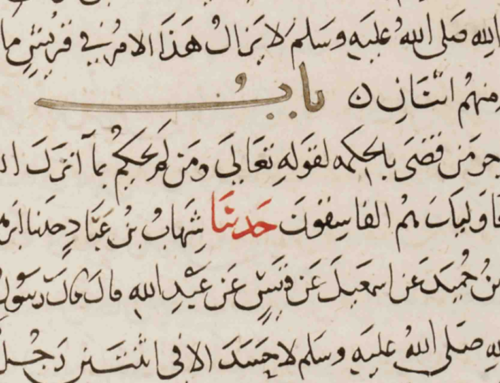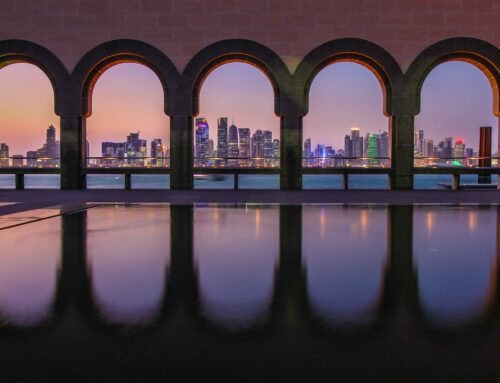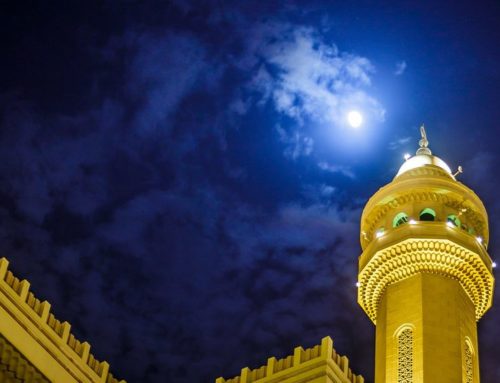Translated by Abdullah Rashid and Sufyan Tihami
Preface
In my Yemen trip journal — published in the Rabi‘ al-Thani 1422 issue of Al-Balagh Magazine — I mentioned, for the sake of reminder, the matter of performing the Friday congregation in Dubai airport. In it, I stated that the correct understanding of public access (idhn al-‘am) [1]The phrase “public access” will be utilized in the remainder of this translation to signify “idhn al-‘am.” that the scholars require for the validity of the Friday congregation is that all the people of the immediate area surrounding where the prayer is being performed must have unrestricted access to the congregation, even if the people outside of that area do not have access to it and are restricted due to an administrative or military reasoning.
After the publishing of this trip journal, some people wrote me letters requesting that clarification upon this issue be written and published. Many years before this occurred, I had written a legal verdict on this very issue which had not been published at the time, and it now seemed appropriate that the verdict be edited, published, and presented in the following pages. However, it should be kept in mind that the ruling of this verdict can only be applied to an airport which is situated in a large city, and one wherein which a large group of people are present at any given time, such as the Dubai Airport.
Question
According to scholars of the religion, is it allowed for prisoners in jail to perform the Friday (Jumu’ah) prayer? I have seen opposing statements in this matter and as such am requesting that a fully detailed answer be given.
Response
In the name of Allah, the All-Merciful, the Very-Merciful.
There is no explicit mention in the books of the early jurists (fuqaha) upon either the permissibility, or impermissibility of performing the Friday congregation in jails. Because of this, the legal opinions of contemporary scholars have differed.
The point of contention here lies in the fact that the Hanafi jurists have stipulated public access as a requirement for the validity of a Friday congregation, whereas a prison does not provide public access. Due to this, it outwardly seems as though the Friday congregation should not be valid in a prison. In the present day, this problem extends to other places, such as military bases, factories, and airports within which the general masses are not granted free access to enter. Due to this, it is necessary to understand the precedence of the condition of public access and its precise meaning.
The understanding of some scholars is that the necessity of public access is specific to a previous era when the Friday congregation was not generally performed in more than one location per city. The purpose of this condition, therefore, was to prevent individuals from being excluded from the Friday congregation causing them to miss their Friday prayer. Now that the permissibility of holding the Friday congregation in multiple areas within the same city has been established and has come into general practice, these scholars assert that the necessity of public access no longer stands as the Friday congregation will not be missed due to restriction of access. As a proof, such scholars quote the following statements of ‘’Allamah [Ibn ‘Abidin] Shami:
“[‘Allamah Haskafi states in al-Durr al-Mukhtar:] ‘If the king intends to perform his Friday congregation in his palace with his ministers, and opens the gates of the palace and proclaims free entry for the people, his prayer is valid whether others attend or not. On the other hand, if he restricts access by locking the doors and placing guards by the entryways, his prayer is not valid. This is because the responsibility of the king is to ensure that others do not miss out on their Friday congregation, which is not established except with public access.’
“[‘Allamah Shami says:] to this I say, this ruling applies only in those cases where the Friday congregation is held in a single location. However, when it is held in multiple locations this condition is not necessary, because the prayer will not be missed (on the basis of absence of public access), as is deduced by the reasoning [2]This denotes a fiqhi ta‘lil (causality) which is as follows: The requirement of public access is based on the premise that if absent, individuals may miss their Friday congregation due to their … Continue reading.” (Radd al-Muhtar, vol. 2, p. 152)
However, certain objections are brought up against this reasoning, namely:
(a) If [the requirement of] public access is only to prevent the Friday congregation from being missed out on, it should then theoretically be valid for one to establish a private Friday congregation within one’s own home while barring all others from it in any city wherein the Friday congregation is performed more than once.
(b) The condition of public access should have been erased from those books of jurisprudence written after it had become widely acceptable and prevalent to pray multiple Friday congregations within a single city.
(c) At the very least these more recent mentions of the condition should have explicitly mentioned that due to multiple Friday congregations performed, the condition applies no more, whereas, the reality of the matter is that the condition is continually mentioned in the books of jurisprudence.
This is a strong objection. However, after deep examination of the books of jurisprudence, the general condition one finds is as follows:
1) The conditioning of public access has not been mentioned in the Zahir al-Riwayah [3]The six authoritative books of the Hanafi school.. Rather, ‘Allamah Kasani mentions:
“He [Imam Muhammad] mentions in the Nawadir [4]Secondary works in the Hanafi school. an extra condition which he did not mention in the Zahir al-Riwayah which is that the prayer must be performed publicly [5]The word “ishtihar” is used here which will be referenced further in this text in the statement of ‘Allamah Shami.. Under this condition, the prayer would not be valid of those who pray with the king after he gathers them in a fort, locks the doors, and leads them in congregation.”
(Bada’i al-Sana’i, vol. 1, p. 279)
In fact, even the author of Al-Hidayah does not mention the condition of public access, along with many other great Hanafi jurists; amongst them: The teacher of Shams al-A’immah as-Sarakhsi, ‘Allamah Sughdi. [6]Refer to An-Nutaf fi ‘l-Fatawa, vol. 1, p. 90) -Mufti Taqi Usmani
2) In conformance to the narration of the Nawadir, some of the latter jurists have mentioned this condition in their books. However, it can be understood from these works that some disagreement is present in the precise requirements of public access. Some have interpreted that the condition is necessary to the extent that every person who is required to perform Friday prayer must be able to attend the Friday congregation. With regards to this, ‘Allamah Shami transmits from ‘Allamah Barjandi and others the following:
“…meaning, that he allows access to the general masses and that he not prevent any such person that is required to perform the Friday prayer to attend (the Friday congregation). This is the meaning intended by those who define public access as ishtihar.” (Radd al-Muhtar, vol.2, p.151)
On the other hand, other jurists have interpreted the condition of public access to have been met in the instance wherein the people of the immediate locality are granted full access to attend the congregation, even if non-locals cannot attend. With regards to this, ‘Allamah Bahr al-‘Ulum explains:
“[It is mentioned] in Fath al-Qadir: ‘If the entrance of the city is closed, it (the prayer) is not valid’. However, some consideration must be adopted here, as access to the prayer is not restricted for those situated within the city. As for those outside of the city, it is not likely that they would attend the congregation. Rather, it is much more likely that they would come to incite crime and corruption.” (Rasa’il al-Arkan, p.115)
In al-Durr al-Mukhtar, it is mentioned:
“It is not problematic if the gate of a fort is locked to prevent enemies or due to a preexisting habit. This is because public access is stipulated for the people of the locality, and the gate being closed is to prevent enemies, not congregants. However, if the gate is not locked, it would be more suitable, as is mentioned in Majma’ al-Anhur.” (al-Durr al-Mukhtar, vol.2, p.152)
In Majma’ al-Anhur, it comes:
“There is no harm in the locking of the gates, a practice common in many fortresses, due to fear of an enemy or due to a preexisting habit, there is no harm therein. This is because the necessity of maintaining public access relates specifically to the residents of the locality. However, keeping the gates unlocked would be more suitable as is mentioned in Sharh ‘Uyun al-Madhahib. [Conversely,] in al-Bahr and al-Minah, the opposite is mentioned. However, what we have considered is more suitable, because public access relates to keeping the doors of the masjid open and not preventing entry, and it has no relation to the gate of a fort. Additionally, the purpose of closing the gates is to prevent enemies, and not to prevent others.” (Majma’ al-Anhur, vol. 1, p. 246)
Through this, it is understood that the meaning intended by the jurists that conditioned public access is that public access had a specific connotation that is not applicable in the presence of multiple congregations. However, the possibility remains that public access was conditioned for other reasons; for example, the author of Badai’ al-Sanai’ mentions that it is implied through the verse of the Quran: “O you who believe! When the call for prayer is commenced, make your way to the remembrance of Allah and leave trade.” (62:9)
With regards to this, ‘Allamah Shurunbulali explains:
“I came upon a short treatise by ‘Allamah Ibn al-Shihnah, and he mentioned therein the impermissibility of performing the Friday congregation in the fort of Cairo, because it is [generally] kept locked at the time of the Friday congregation and is not a standalone city.
“I comment: There is significant consideration to be taken before claiming impermissibility. This is because the reasoning for not allowing the Friday congregation of a king in his locked palace is because of his privacy therein and exclusion of attendants who would otherwise miss their Friday congregation, and that issue is not present here. In the fort, even if it is locked, the ruler is not performing his congregation privately, rather there are a sizeable number of individuals present within the compound.
“Additionally, there are several mosques outside the compound and no one will miss out on the Friday congregation due to the gates being locked. Rather, if the gates were left open, one would probably still not go inside, as it would not be necessary to make the extra effort to attend the prayer within the compound. In every section of the city, there are several Friday congregations, so there would be no reason to prevent a congregation from being valid based on being in a locked fort.” (Maraqi al-Falah, p. 278)
Although ‘Allamah Tahtawi does bring up a minor objection under this line in his commentary, it is nonetheless understood that the intent of ‘Allamah Shurunbulali was that, in the presence of multiple congregations, it is not necessary to take the broad meaning of public access wherein every person required to perform the congregation must have access to a Friday congregation. Therefore, public access will be sufficed if the prayer is performed in such a communal area wherein people reside, multiple congregations are performed, and all the people of the locality have access to a congregation, under the condition that the purpose for restricting access is for a strategic or public benefit and not simply to prevent people from attending the congregation. If this is the meaning to be understood from the statements of ‘Allamah Shurunbulali, the objection of ‘Allamah Tahtawi will not hold.
Thus, it cannot be said that the condition of public access will be completely unnecessary in a place where multiple congregations are held. Rather, if the congregation is performed in a public area (not a private house or the likes), the local people are granted access to it, and outside access is prevented for a strategic or public benefit and not to simply prevent them from attending the prayer, this will not be contrary to public access under the condition that all people are granted access to some place to pray.
One objection may remain, which is that the jurists have specifically mentioned that is not permissible for prisoners to perform a Zuhr congregation independently on Friday (See Fath al-Qadir, vol. 2, p. 35). It can be deduced from this that prisoners are not allowed to perform the Friday prayer. Otherwise, there would be no need for them to perform a Zuhr congregation.
The response to this, considering the clarifications of ‘Allamah Shami and ‘Allamah Shurunbulali, is that these statements were mentioned regarding the era when everyone would perform one Friday congregation under the leader, and no other congregation would be allowed besides it. Along with this, it must be kept in mind that there were various classifications of prisons. It is possible that such statements were mentioned with respect to those prisons that would comprise of just [the area of] one house or so, where it would not be possible to consider it an open area.
Another possible objection may arise in the fact that Badai’ al-Sana’i mentions the following:
“If the king prays in a castle while the people are praying behind the appointees of the king in the local mosques, his prayer will be valid as long as he keeps the door open and allows public access in both locations. However, if he does not allow the masses to attend and prays privately with his army his prayer is not valid, but the prayer of the general masses is valid.” (Bada’i al-Sana’i, vol. 1, p. 269)
This scenario requires multiple congregations to be taking place. Despite this, the ruler’s restriction of public access still renders his prayer invalid. However, it is apparent that this is a case where the ruler performs the prayer in his palace with only his ministers and excludes everyone else, as indicated by the statement, “if he leaves open the door to the palace”. Due to this, it is inferred that the cause of invalidity is him praying in a private home and, as mentioned earlier, the fact that public access remains necessary when the congregation is held in a private home. However, if the congregation is held in such a public place that has considerable attendees without open access, the same ruling will not apply.
Conclusion
All that has been mentioned may be summed up as follows:
1) If there is a place in which — through the command of the ruler — only one congregation is held, public access must be provided to the extent that all people upon whom the Friday prayer is obligatory may be able to attend. Without this level of public access, the entire congregation is invalid.
2) Similarly, if a congregation is being held in a private home, house, or store, the congregation will not be valid unless such public access is found, as was mentioned in the last point, even if the congregation is being performed in other areas in the same city.
3) If there is an area where enough eligible people are present, but access to that area is blocked from the outside due to a public or strategic benefit, the congregation will be sound provided the local people have unequivocal, unrestricted access to it. For example, in large prisons, military bases, or big airports which are in sufficiently large cities and always have at least 100 people — despite their restricted access granted to people outside — the Friday congregation will be permissible, subject to the preceding condition that all the people in that prison, factory, airport, or railway station have unrestricted access to the congregation.
Allah — the Majestic — is best-aware of what is correct.
(Fiqhi Maqalat, vol. 4, p. 31)
| ↑1 | The phrase “public access” will be utilized in the remainder of this translation to signify “idhn al-‘am.” |
|---|---|
| ↑2 | This denotes a fiqhi ta‘lil (causality) which is as follows: The requirement of public access is based on the premise that if absent, individuals may miss their Friday congregation due to their exclusion from it. Because the fear of missing the prayer is not found in this instance, the requirement of public access will also be removed. |
| ↑3 | The six authoritative books of the Hanafi school. |
| ↑4 | Secondary works in the Hanafi school. |
| ↑5 | The word “ishtihar” is used here which will be referenced further in this text in the statement of ‘Allamah Shami. |
| ↑6 | Refer to An-Nutaf fi ‘l-Fatawa, vol. 1, p. 90) -Mufti Taqi Usmani |







Masha allah good work keep doing it